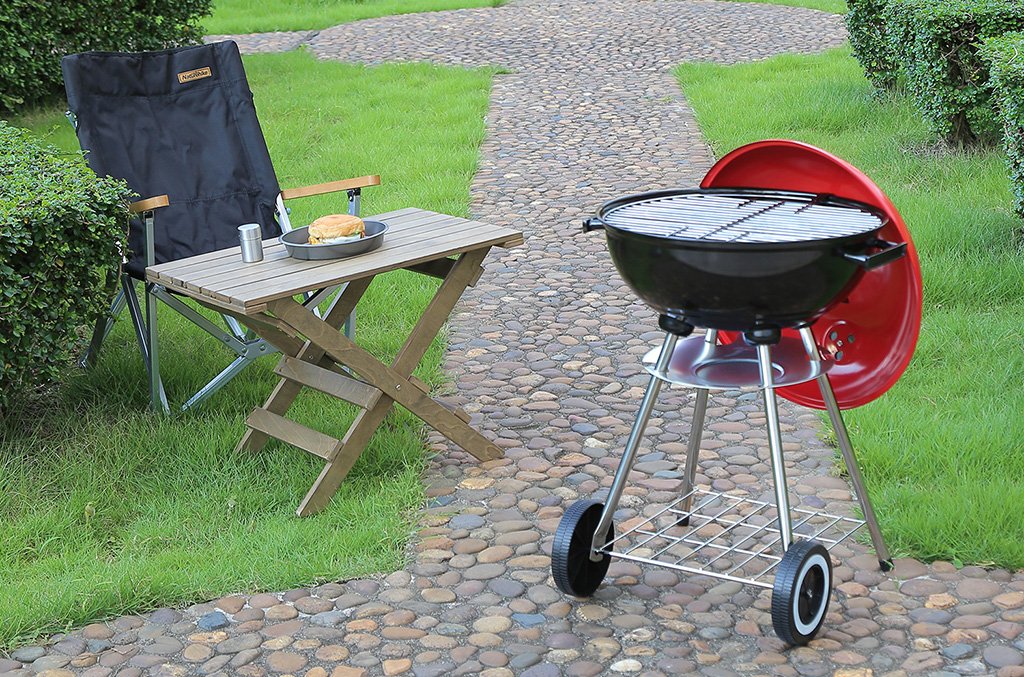Brief overview of electric and charcoal grills.
2. Functionality of Electric Grills
How electric grills work.
Advantages and disadvantages.
3. Functionality of Charcoal Grills
How charcoal grills work.
Advantages and disadvantages.
Electric grill heat control mechanisms.
Charcoal grill heat control methods.
Impact of electric grills on flavor.
Flavor characteristics of charcoal-grilled food.
6. Convenience and Portability
Ease of use and portability of electric grills.
Considerations for charcoal grill portability.
Initial cost and ongoing expenses for electric grills.
Cost considerations for charcoal grills.
Environmental implications of electric grill usage.
Considerations regarding charcoal grill emissions.
Maintenance requirements for electric grills.
Cleaning process for charcoal grills.
Cooking options and versatility of electric grills.
Flexibility and versatility of charcoal grills.
Safety features of electric grills.
Safety precautions for charcoal grills.
Top electric grill brands and models.
Notable charcoal grill brands and models.
Customer reviews and experiences with electric grills.
Feedback and testimonials from charcoal grill users.
Factors to consider when choosing between electric and charcoal grills.
Summarize key differences and considerations for choosing between electric and charcoal grills.
What's the Difference Between an Electric Grill and a Charcoal Grill?
When it comes to grilling, the debate between electric and charcoal grills has long been a topic of contention among barbecue enthusiasts. Each type of grill comes with its own set of advantages and disadvantages, making the decision between them a matter of personal preference and practicality. In this article, we'll delve into the nuances of electric and charcoal grills, exploring their functionality, flavor differences, convenience factors, cost considerations, environmental impacts, maintenance requirements, safety features, and more. So, let's fire up the grill and uncover the differences between these two popular cooking methods.
Functionality of Electric Grills
Electric grills operate by using electricity to heat up a cooking element, typically a metal coil or infrared heating element. These grills are designed for indoor or outdoor use and are popular among urban dwellers or those living in areas where open flames are restricted. One of the main advantages of electric grills is their ease of use – simply plug them in, and they're ready to cook. However, they may lack the smoky flavor imparted by charcoal grills, which could be considered a downside for some barbecue purists.

Functionality of Charcoal Grills
On the other hand, charcoal grills rely on charcoal briquettes or lump charcoal as their primary fuel source. These grills require manual ignition and preheating, but they offer the benefit of achieving higher temperatures, which is ideal for searing meats and achieving that classic grilled flavor. Charcoal grills are favored by many barbecue aficionados for their ability to impart a smoky taste to food, elevating the grilling experience to new heights.

Heat Control
Electric grills typically feature adjustable temperature controls, allowing users to easily regulate the heat level according to their cooking needs. In contrast, controlling the heat on a charcoal grill requires more finesse and skill, as it involves adjusting the airflow to maintain the desired temperature. While electric grills offer precise temperature control, some argue that the natural variability of charcoal grills adds to the charm of outdoor cooking.
Flavor Differences
One of the most significant differences between electric and charcoal grills is the flavor profile they impart to food. Electric grills tend to produce a cleaner, more neutral taste, as they don't generate smoke or combustion byproducts. In contrast, charcoal grills infuse food with a rich, smoky flavor that is characteristic of traditional barbecue cuisine. For many grill enthusiasts, this distinctive flavor is an integral part of the grilling experience and cannot be replicated with electric grills.
Convenience and Portability
When it comes to convenience and portability, electric grills have the upper hand. They are lightweight, compact, and easy to transport, making them suitable for small outdoor spaces, balconies, or camping trips. Additionally, electric grills can be used indoors, providing a grilling solution year-round, regardless of the weather conditions. On the other hand, charcoal grills are bulkier and require more effort to set up and transport, but they offer the authentic outdoor grilling experience that many enthusiasts crave.
Cost Comparison
In terms of cost, electric grills are generally more affordable upfront compared to charcoal grills. Additionally, they require minimal maintenance and consume less fuel, resulting in lower operating costs over time. However, charcoal grills have the advantage of being readily available and cost-effective to operate, as charcoal briquettes are relatively inexpensive. Ultimately, the cost considerations will depend on factors such as frequency of use, fuel expenses, and personal budget constraints.
Environmental Impact
From an environmental standpoint, electric grills are often perceived as more eco-friendly than charcoal grills. They produce fewer emissions and do not contribute to deforestation, as charcoal production involves the burning of wood. However, electric grills rely on electricity, which may be generated from non-renewable sources, such as coal or natural gas. Charcoal grills, while less energy-efficient, utilize a renewable resource (wood) and have a lower carbon footprint when sustainably sourced.
Maintenance and Cleaning
When it comes to maintenance and cleaning, electric grills have the edge over charcoal grills. Electric grills are easy to clean, with removable grates and drip trays that can be washed with soap and water. In contrast, charcoal grills require more effort to clean, as ash and grease buildup must be manually removed from the grill grates and ash catcher. Additionally, electric grills typically have fewer mechanical parts, reducing the likelihood of maintenance issues.
Versatility
Electric grills offer versatility in terms of cooking options, as they can be used for grilling, roasting, and even smoking foods. Many electric grills come with additional features such as temperature probes, rotisserie attachments, and adjustable cooking surfaces, allowing users to customize their grilling experience. On the other hand, charcoal grills excel in imparting a smoky flavor to food and are well-suited for traditional barbecue dishes such as ribs, brisket, and pulled pork.
Safety Considerations
Safety is a crucial factor to consider when choosing a grill, especially for indoor use. Electric grills are generally considered safer than charcoal grills, as they do not produce open flames or emit potentially harmful gases such as carbon monoxide. Additionally, electric grills often come with built-in safety features such as automatic shutoff if the grill overheats or tips over. However, users should still exercise caution when operating electric grills, especially when using them in confined spaces or near flammable materials.
On the other hand, charcoal grills pose certain safety risks due to the open flame and combustion process involved in charcoal combustion. It's essential to place charcoal grills on stable surfaces away from combustible materials and to monitor them closely while in use. Additionally, proper ventilation is crucial to prevent the buildup of carbon monoxide, which can be lethal if inhaled in high concentrations.
Popular Brands and Models
In the realm of electric grills, brands like George Foreman, Weber, and Hamilton Beach are well-known for their quality and reliability. These brands offer a range of electric grill options, from compact tabletop models to larger freestanding units with advanced features.
For charcoal enthusiasts, iconic brands such as Weber, Char-Broil, and Kamado Joe dominate the market. These brands offer a variety of charcoal grill styles, including kettle grills, kamado grills, and barrel grills, catering to different cooking preferences and budgets.
YEENE charcoal grill manufacturer also good, we are from China, and sell a lot of bbq grill to global every year. we can manufacture according to your drawing or sample if you want to wholesale charcoal grill or custom your brand. Contact our team to start your business.
User Experience
When it comes to user experience, opinions vary widely depending on individual preferences and cooking habits. Some users appreciate the convenience and consistency of electric grills, while others swear by the authentic flavor and experience of cooking over charcoal.
Electric grill users often praise the ease of use, quick preheating times, and precise temperature control offered by electric models. They also appreciate the ability to grill indoors without the hassle of dealing with charcoal or propane tanks.
On the other hand, charcoal grill enthusiasts relish the ritual of lighting charcoal, tending to the fire, and imparting that unmistakable smoky flavor to their food. Many find the hands-on approach to charcoal grilling therapeutic and enjoy the social aspect of gathering around a charcoal grill with friends and family.
Choosing the Right Grill
Ultimately, the decision between an electric grill and a charcoal grill comes down to personal preference, lifestyle factors, and cooking priorities. Here are some key factors to consider when choosing the right grill for your needs:
1. Flavor Preference: If you prioritize smoky flavor and authenticity, a charcoal grill may be the way to go. However, if you prefer cleaner, more neutral-tasting food, an electric grill might be a better fit.
2. Convenience vs. Tradition: Electric grills offer convenience and ease of use, making them ideal for quick weekday meals or indoor grilling. Charcoal grills, on the other hand, embody the time-honored tradition of outdoor cooking and may appeal to those seeking a more rustic grilling experience.
3. Space and Portability: Consider your living situation and outdoor space limitations. Electric grills are well-suited for apartment balconies, small patios, and indoor use, while charcoal grills require more space and ventilation.
4. Budget and Operating Costs: Take into account the initial cost of the grill, as well as ongoing expenses such as fuel and maintenance. Electric grills are typically more affordable upfront and have lower operating costs, but charcoal grills may offer better value over time, especially for frequent grillers.
5. Environmental Impact: If sustainability is important to you, consider the environmental implications of your grill choice. While electric grills may be perceived as more eco-friendly due to their lower emissions, charcoal grills can be sustainable if charcoal is sourced responsibly from renewable forests.
Conclusion
In conclusion, the choice between an electric grill and a charcoal grill boils down to personal preference, lifestyle considerations, and cooking priorities. Electric grills offer convenience, ease of use, and versatility, making them suitable for indoor and outdoor grilling alike. However, charcoal grills provide an authentic grilling experience, complete with smoky flavor and traditional charm. Whether you're a novice griller looking for simplicity or a seasoned pitmaster seeking authenticity, there's a grill out there to suit your needs.
Frequently Asked Questions (FAQs)
1. Can I use an electric grill indoors?
Yes, electric grills are designed for indoor use and can be safely used in well-ventilated areas such as kitchens or balconies.
2. Do electric grills produce smoke?
Electric grills do not produce smoke during the cooking process, as they rely on electric heating elements rather than combustion.
3. Are charcoal grills more difficult to clean?
Charcoal grills require more thorough cleaning due to ash and grease buildup, but with proper maintenance, they can be kept clean and functional.
4. Which type of grill is better for beginners?
Electric grills are often recommended for beginners due to their ease of use, quick preheating times, and precise temperature control.
5. Can I achieve the same flavor with an electric grill as with a charcoal grill?
While electric grills offer convenience and consistency, they may not replicate the smoky flavor imparted by charcoal grills. However, some electric models come with features designed to mimic the flavor of traditional grilling.